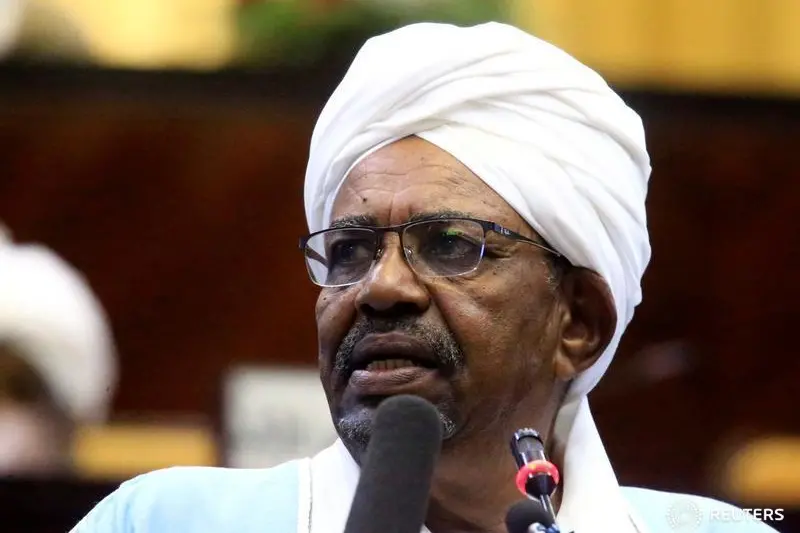PHOTO
LONDON - In the hazy world of distressed debt trading, the fall of Sudan's autocratic ruler of 30 years, Omar al-Bashir, has sparked fresh interest among traders and holders of the country's long-defaulted debt.
Following weeks of demonstrations kindled by soaring food costs, high unemployment and increasing repression, 75-year-old Bashir was overthrown on Thursday by the military, three decades after himself seizing power in a coup.
The newly ruling military council on Friday promised a transition to an elected civilian government.
Frozen for the best part of four decades, Sudan's debt is part of a highly opaque market of legacy debts of countries isolated from the rest of the international community, such as pre-Castro Cuban debt or loans issued by North Korea.
Apart from defaulting on payments from the early 1980s onwards, Sudan was also subject to U.S. sanctions linked to the conflict in Darfur for nearly two decades until 2017.
"This is a big moment for the country. Now we need to see what happens next, what sort of a government or leader they will get, and how the situation will develop," said one holder of the defaulted loans, speaking on condition of anonymity.
"There's a potential for real change, but change isn't always for the better and it could take a very long time for things to improve."
Much of Sudan's distressed debt trading centres around a state-guaranteed loan issued in 1981 as part of a debt restructuring agreement with a principal of 1.64 billion Swiss franc ($1.64 billion). Shortly after, the Sudanese government defaulted again on its obligations on the loan.
By now analysts estimate the amount due including nearly four decades of unpaid interest amounts to around 8 billion Swiss francs ($7.99 billion).
Loans are rarely changing hands, though distressed debt traders say they last priced between 7-9 cents in the dollar.
ISOLATED FROM MARKETS
Sudan has been cut off from international markets for years.
The U.S. government lifted most of its sanctions on Sudan in February 2017, but kept the country on its list of state sponsors of terrorism. This keeps the economy in a stranglehold, making it next to impossible for businesses to operate in dollar transactions and cutting off any access to international capital markets and many other funding sources for the government.
Apart from Somalia, Sudan is now the only country in the world with arrears to the International Monetary Fund (IMF), accounting for more than 80 percent of money overdue to the multilateral lender.
The impoverished northeastern African country is buckling under its debt with defaulted loans owed to the private sector making up just a small part of the burden.
"Public external debt is around $51 billion," said Stuart Culverhouse, head of sovereign & fixed income research at Exotix, citing 2016 IMF data. "(This) is 88 percent of GDP. The ratio is likely to be higher now because of a weaker currency."
The IMF stated in its December 2017 report that Sudan was eligible for debt relief under the Heavily Indebted Poor Countries (HIPC) plan - an IMF and World Bank initiative launched in 1996 to help poor countries struggling with external debt obtain debt relief.
“Economic conditions in Sudan have been challenging since the secession of South Sudan in 2011 and the loss of the bulk of oil production and exports, which have compounded the difficult external environment,” the IMF report said.
RETHINK
Once a country has overhauled its debt burden with bilateral and multilateral lenders, it must come to an agreement with private sector lenders before being able to access international capital markets again.
Taking a punt on major regime changes, distressed debt investors in general are happy to slog it out, though the latest market developments have seen some rethink their position.
One debt trader reported a seller had withdrawn a Sudan position, wanting to see what happened first. Yet others were gauging if a possible spike in price could be an opportunity to sell.
Excitement over investment in Cuba for instance has gone tepid after U.S. President Donald Trump reversed his predecessor Barack Obama’s rapprochement with Havana. North Korean debt moved further into the twilight zone after Washington imposed fresh sanctions on Pyongyang in 2017.
"We've had a few setbacks lately, some may well think a spike in prices now could be a good time to get out," said the holder of defaulted Sudan debt. ($1 = 1.0015 Swiss francs)
(Reporting by Karin Strohecker Editing by Mark Heinrich) ((karin.strohecker@thomsonreuters.com; +442075427262; Reuters Messaging: karin.strohecker.reuters.com@reuters.net))





















